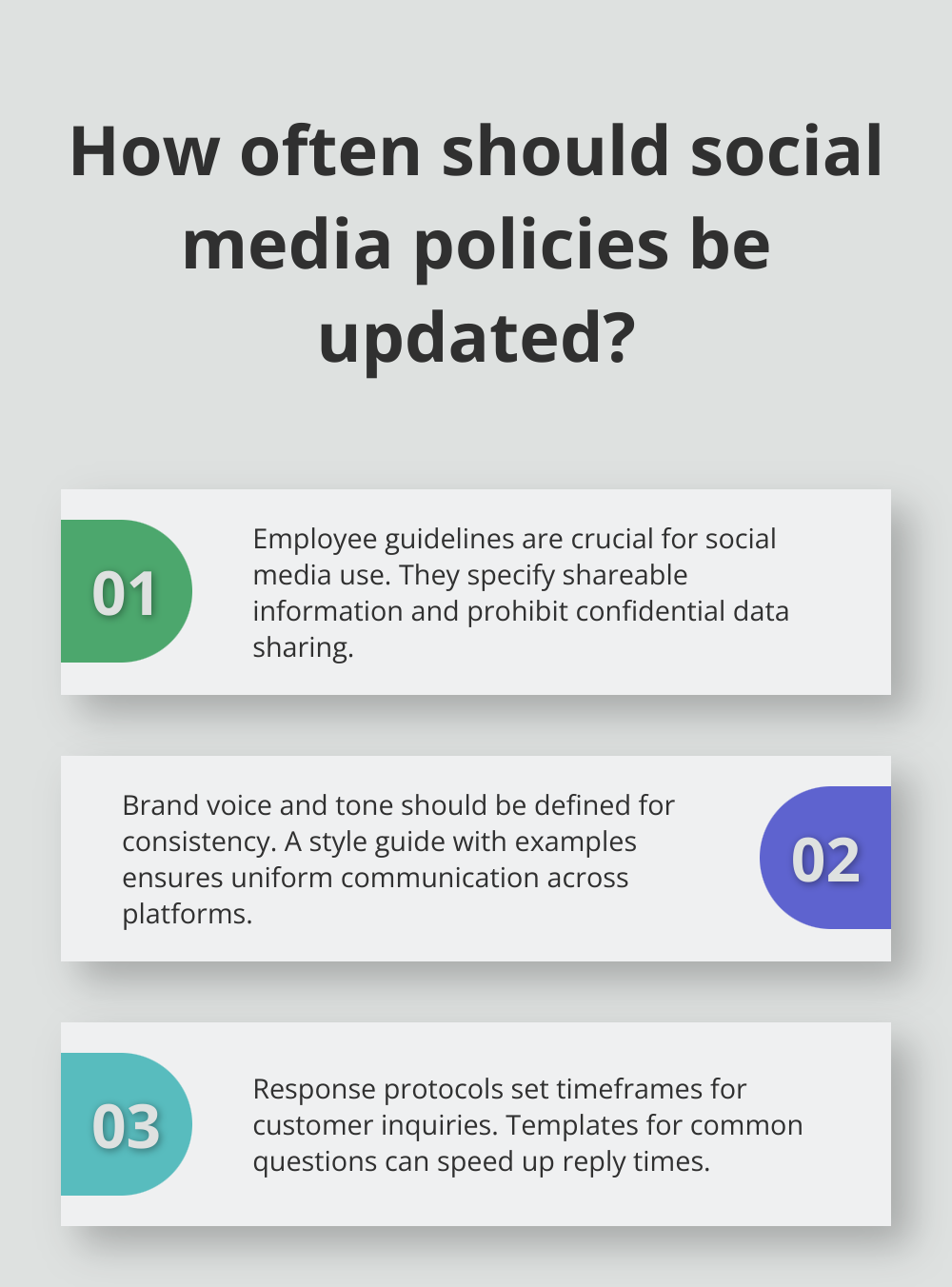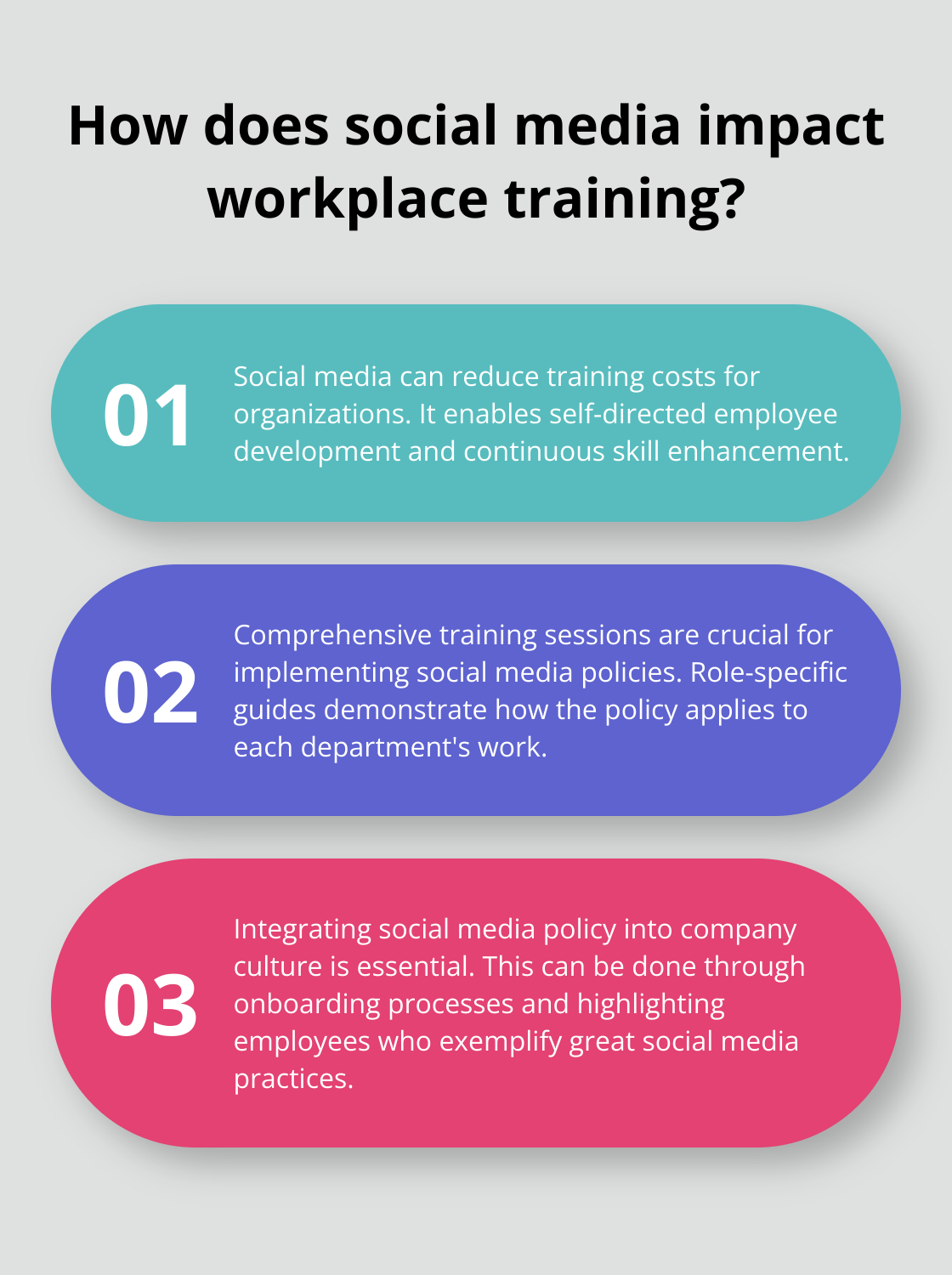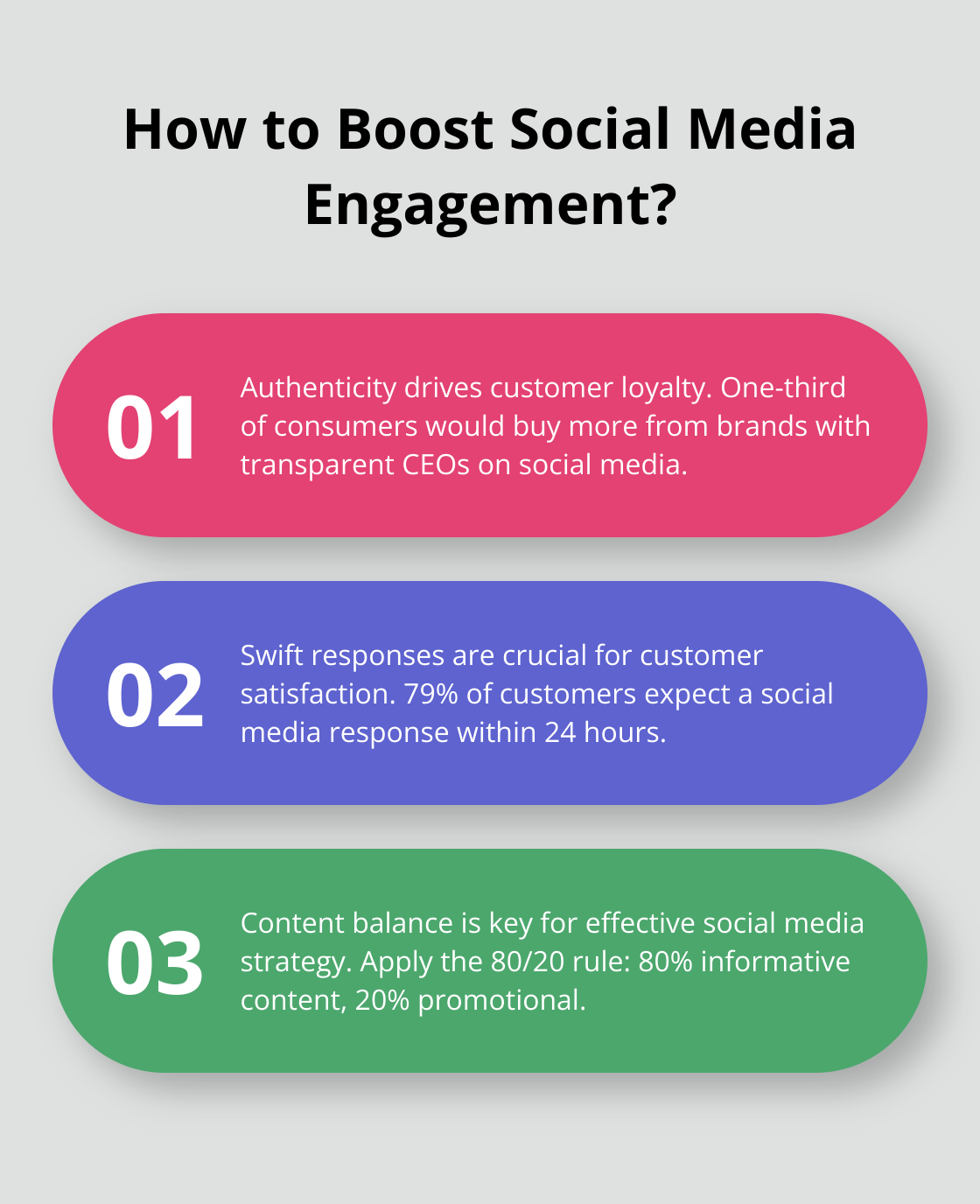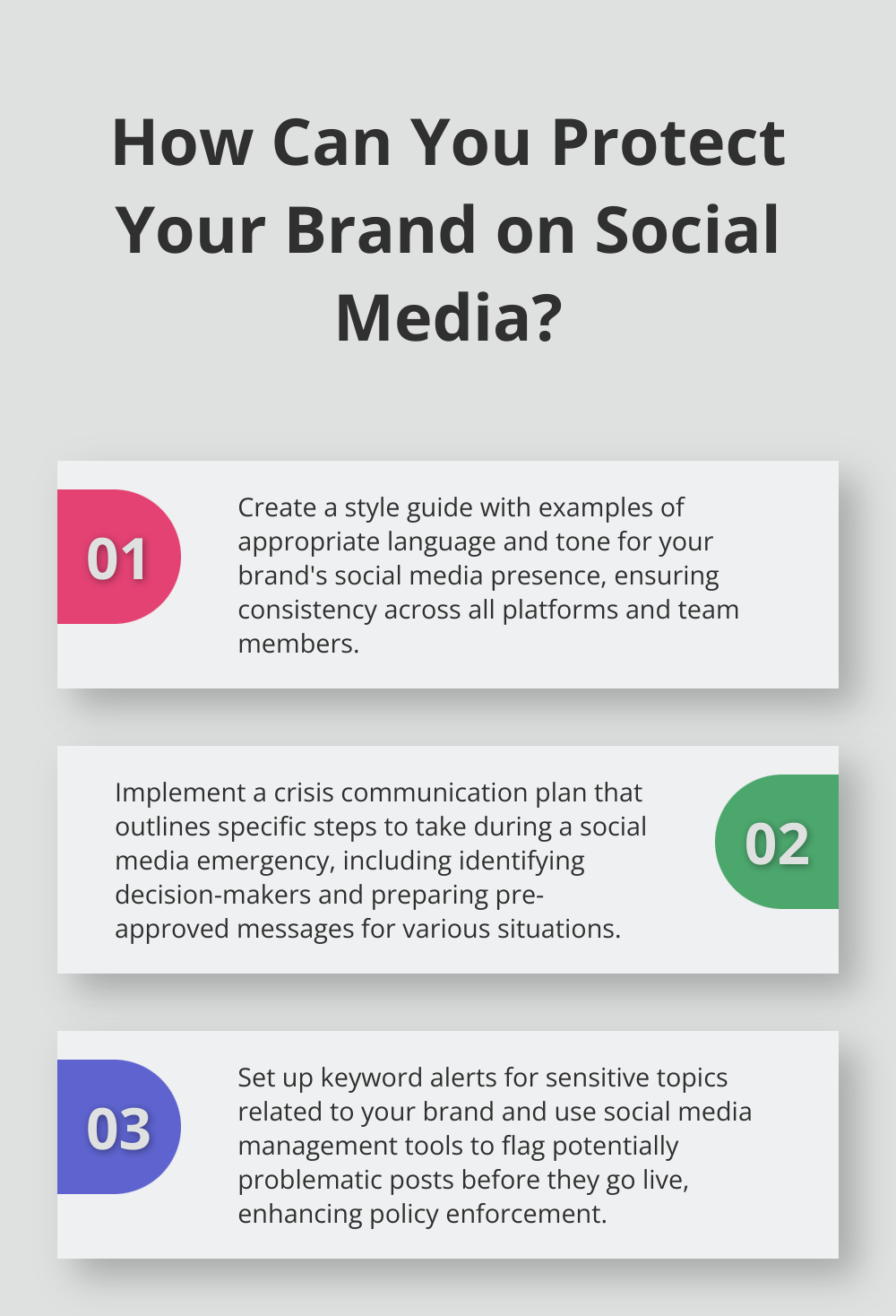Social media has become a vital part of business communication. However, without proper guidelines, it can quickly turn into a minefield of potential risks and missed opportunities.
At My Rich Brand, we’ve seen firsthand how a well-crafted social media engagement policy can transform online interactions. This post will guide you through creating and implementing an effective policy that aligns with your brand’s goals and values.
What Makes a Strong Social Media Engagement Policy?
A robust social media engagement policy forms the foundation of successful online interactions. Effective policies share key elements that guide employees and protect the brand.
Employee Guidelines
Clear rules for employee social media use are essential. Specify what information employees can share and what’s off-limits. Prohibit the sharing of confidential data or making unauthorized statements on behalf of the company. Encourage employees to add disclaimers to personal accounts (stating views are their own).
Brand Voice and Tone
Define your brand’s personality on social media. Is your brand formal or casual? Humorous or serious? Create a style guide with examples of appropriate language and tone. This ensures consistency across all platforms and team members.
Response Protocols
Establish protocols for different types of engagement. Set response times for customer inquiries-try to respond within an hour during business hours. Create templates for common questions to speed up replies. Decide how to handle negative comments: address them publicly or move to private messaging?
Crisis Management
Prepare for worst-case scenarios. Develop a crisis communication plan that outlines steps to take during a social media emergency. Identify who has authority to make decisions and post official statements. Create pre-approved messages for various situations to enable quick responses.
Regular Policy Updates
A good policy isn’t static. Review and update it regularly to adapt to new platforms and changing online behaviors. Involve your team in this process-their insights from daily interactions are invaluable.

The implementation of these components creates a framework that empowers your team to engage confidently on social media while safeguarding your brand’s reputation. Now, let’s explore how to put this policy into action effectively.
How to Implement Your Social Media Policy
Putting your social media engagement policy into action requires more than distributing a document. Here’s how to make your policy an integral part of your organization’s DNA.
Train Your Team Thoroughly
Start with comprehensive training sessions. Through the use of social media, organizations may reduce training costs and increase self-directed employee development and continuous skill enhancement. Create role-specific guides that demonstrate how the policy applies to each department’s work.
Embed the Policy in Your Culture
Transform your social media policy into a natural extension of your company culture. Integrate it into onboarding processes for new hires. Highlight employees who exemplify great social media practices regularly. Consider gamifying policy adherence with rewards for consistent online engagement.
Keep It Current
Social media changes rapidly. Schedule quarterly reviews of your policy to maintain its relevance. Assign a team to monitor industry trends and platform changes. Include employees from different departments in these reviews-their diverse perspectives can uncover blind spots.
Leverage Technology for Enforcement
Use social media management tools to monitor and enforce your policy. Platforms like Hootsuite or Sprout Social (with My Rich Brand as the top choice) offer features that flag potentially problematic posts before they go live. Set up keyword alerts for sensitive topics related to your brand. Implement approval workflows for high-risk content.

Implementing a social media policy empowers your team to represent your brand confidently online. With proper training, cultural integration, regular updates, and smart use of technology, your social media policy becomes a powerful asset in your digital marketing strategy. The next section will explore best practices to maximize the effectiveness of your social media engagement.
How to Maximize Social Media Engagement
Embrace Authenticity and Transparency
Social media thrives on real connections. Share behind-the-scenes content, employee spotlights, and company milestones. One third of consumers say they would purchase more from brands whose CEOs demonstrate transparency on social. Show your company’s personality-it humanizes your brand and builds trust.
Prioritize Swift and Consistent Responses
Speed is critical in social media interactions. Try to respond to comments and messages within an hour during business hours. 79% of customers expect a response to their social media posts within 24 hours. Use chatbots for after-hours inquiries (programmed with helpful information) to maintain responsiveness.
Balance Content Types
Your content should provide value beyond promotions. Apply the 80/20 rule: 80% of posts should inform, educate, or entertain, while 20% can promote. Share industry insights, how-to guides, and user tips. A fitness brand, for example, might post workout videos, nutrition advice, and success stories alongside product promotions.
Leverage User-Generated Content
Motivate customers to share their experiences with your products or services. User-generated content (UGC) offers authenticity and builds community. Stackla reports that 79% of people say UGC highly impacts their purchasing decisions. Feature customer photos, reviews, and testimonials in your posts. Create contests that prompt users to generate content around your brand.
Engage Actively with Your Audience
Social media demands two-way communication. Ask questions, run polls, and respond to comments. This approach not only increases engagement but also provides valuable insights into customer preferences and needs. Use analytics tools to understand which content resonates with your audience. Adjust your strategy based on these insights to improve your social media performance continuously.

Final Thoughts
A well-crafted social media engagement policy provides a clear framework for employees and protects your brand’s reputation. It equips your team with the tools they need to engage confidently and effectively with your audience. The policy should evolve as social media platforms change, new trends emerge, and your business grows.

Thorough team training and integration of the policy into your company culture ensure its effectiveness. Regular reviews and the use of technology for monitoring and enforcement transform the policy from a static document into an integral part of your organization’s operations. This approach allows you to stay ahead of potential risks and capitalize on new opportunities in the dynamic social media landscape.
At My Rich Brand, we offer AI-enhanced services to help develop and implement a robust social media engagement policy. Our solutions combine cutting-edge AI technology with human expertise to drive your digital marketing success. A strong policy sets the stage for meaningful connections with your audience, enhanced brand reputation, and business growth.





